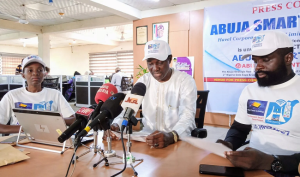The Havel Corporate Concept, an affiliate of ioSafe Nigeria, has unveiled projects designed to transform Abuja into a smart city.

The Chief Executive Officer of the organisation, Dr Ahmed Badanga, unveiled the projects at a media briefing in Abuja on Friday, May 10, 2024.
Badanga identified the projects as Abuja Smart City Project and Abuja Residents Smart Card Project.
He explained that the Abuja Smart City Project, which would be implemented in collaboration with critical stakeholders, would make governance, transport, tourism, health, business, and homes smarter.
The. CEO said that the team would explore a Public-Private-Partnership, not just on financial agreements but also in the sharing of expertise, risks, and rewards, in pursuit of mutual and public interests.
He said that the smart city project was tailored-based on local peculiarities, people, and the current state of Abuja city, as against the practice of allocating land to build a smart city within a city.
“We are blending global standards with our unique Abuja identity, utilising, and leveraging existing infrastructure, technology, and services within and outside Abuja metropolis,” he said.
According to him, the goal is to transform Abuja to a smarter, faster, and reliable service provider, and a city where technology and innovation meets hospitality.
He said that the project, when completed, will facilitate real time access to service and transaction via internet, artificial intelligence and customised mobile application tagged, “Abuja Smartcity App”, a one stop shop.
This, according to him, will improve the quality of life of Abuja residents.
“The project is designed to redefine Abuja city, where services are provided smartly by unlocking the potentials of the city to allow people to live, explore, work with ease, and relax pleasantly.
“This is in line with the Sustainable Development Goals 11, which seeks to make cities inclusive, safe, resilient, and sustainable,” he said.
He explained that the project would be built in phases, based on existing structures by adopting local content that focused on customer support systems.
He added that the project would rely majorly on technology, particularly internet, Wi-Fi, voice services, fiber optic infrastructure, and satellite services available in the city among others.
“This will create Abuja, where all activities and responsibilities are interconnected with an array of sensors and data collectors, distributed throughout the city, and monitored centrally,” he added.
On the Abuja Residents Smart Card Project, Badanga said that the digital biometric database was designed to drive the Abuja Smart City vision to reality.
He said that the proposed card would have basic features of e-payment and biometric data to enable the holders to access government, security, financial, and transportation services.
According to him, efficient public services are not possible without a resident smart card and digital database.
“The idea of the smart card is to build a reliable database of all residents of Abuja to support the proposed smart city.
“This will enhance an effective and realistic ecosystem for planning, especially in the provision and delivery of social services and amenities.
“This is critical, considering the continued influx of migrants seeking economic opportunities and better life, thereby, increasing the city population with implication on social services, infrastructure, and security.”
To ensure the success of the projects, Badanga said that the organisation would carry out an extensive awareness campaign toward building smart people, to access smart services, in a smart city.
He disclosed that Vice President Kashim Shettima would officially unveil the Abuja Smart Strategic Road Map, during the 2nd edition of the Nigeria Data Expo and Conference scheduled for July 23, 2024.
By Philip Yatai
